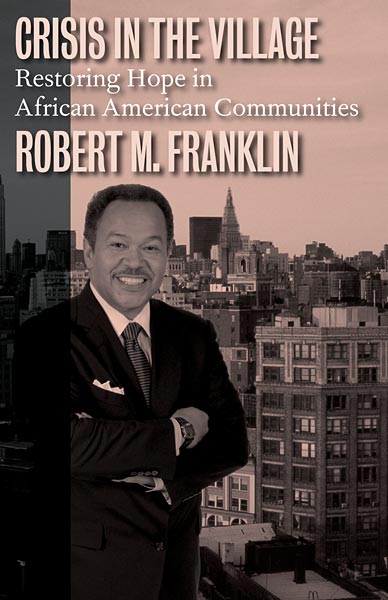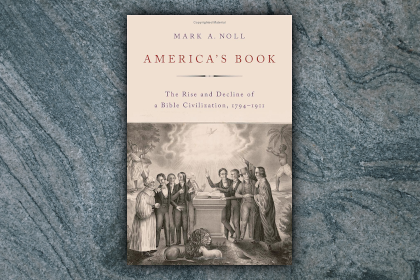Book Review—Crisis in the Village
Reviewed by Beth Murschell
Franklin, Robert M. Crisis in the Village: Restoring Hope in African American Communities. Minneapolis: Fortress Press, 2007. Paperback, 271 pages. $15.00
(Review copy courtesy of Augsburg Fortress Press) Purchase: Augsburg Fortress | CBD | Amazon
Purchase: Augsburg Fortress | CBD | Amazon
Special Features: End Notes; Index
ISBNs: 0800638875 / 9780800638870
LCCN: E185.86.F72 2007
DCN: 305.896’073009045
Subjects: African-Americans, Religion
Read an excerpt of Franklin’s critique on The Prosperity Movement.
Robert M. Franklin (Ph.D., University of Chicago) is Presidential Distinguished Professor of Social Ethics at the Candler School of Theology at Emory University. He is the former president of the Interdenominational Theological Center in Atlanta. Prior to joining the faculty at Emory, he was a visiting lecturer at Harvard Divinity School. He previously served as the dean of Black Church Studies at Colgate-Rochester Divinity School, a program officer in Human Rights and Social Justice at the Ford Foundation, and a Theologian in Residence at the Chautauqua Institution.
Reading Crisis in the Village was, for me, a bit like reading someone else’s mail. Robert Franklin’s formidable book presents a multitude of strategies for “Restoring Hope in African American Communities,” all of which are aimed at members of “the Village.” That being said, I valued the opportunity to see into the heart of a man who is passionate about making a difference in the lives of his fellow African-Americans.
He wrote the book to meet the need for a plan that does the following:
- Enlists specific institutions.
- Assigns specific roles to them.
- Elaborates an accountability framework.
- Incorporates a developmental approach to action mobilization.
- Appeals for broad public moral support, and
- Mobilizes every willing and able person to tackle the problems that now threaten our families, our communities, and our democracy (p. 2).
In chapter one, Franklin begins by citing the efforts of Bill Cosby, who “decided to be courageously inappropriate” (p. 41) during a speech commemorating the 50th anniversary of desegregation a few years ago to chastise “some urban black and low-income parents whom he believed had not done their best to rear kids with love and discipline” (p. 41). Though Franklin considers Cosby’s speech a “rhetorical ground zero” (p. 47) in the conversation about black families, he believes that “relatively few parents are guilty of the behavior that Cosby has targeted.”
The remainder of the book is laid out in four sections (in exhaustive detail, complete with historical context and relevant quotes from various leaders). The first three chapters include the following: (1) “Families: A Crisis of Commitment,” (2) “Churches: A Crisis of Mission,” and (3) “Colleges: A Crisis of Moral Purpose.” The last of the four sections (and the most practical) is “Strategies: Renewing the Village.” He does not dedicate a segment of the book to discussing what the government is meant to do, though lobbying and assistance are taken for granted.
The section on strategies made the entire book worthwhile for me. He gives specific assignments, beginning with this one: “The elders of the village should pray for our renewal” (p. 221). Much of this portion could be taken as read and presented in our own pulpits. Franklin also speaks of reconciliation and forgiveness and love. On the flip side, fundamentalists who read his words will notice the ecumenical spirit that pervades the book. I believe it is worth wading through the less-conservative portions of the book in order to gain insight into a community most of us have not penetrated.
So why read it? First, read it to be aware of what black leaders are doing for the good of the black community and to know how to help. Second, read it to gain insight into the cultural/historical context of the lives of our African-American brothers and sisters. For example, one section is called “What Everyone Should Know About Black Families” (p. 42). Third, read it because portions of it apply across cultural/racial boundaries (we need the same things in our families, churches, and schools). Just be prepared—it’s a long, slow, academic read for the most part, enlivened by occasional side excursions into the author’s own experiences.
 Beth Murschell is married to Mick, a computer programmer, and they live in Bradenton, Florida. Her master’s degree is in music education, but her past work experience includes industrial cleaning, childcare, bumper factory, fast food, camp work (three different camps), music team, telemarketer, media center, music educator, sixth-grade teacher, maid, retail, writer, and now mother of four. She has lived in Panama City, Louisville, Greenville, Miami, Brevard, Quakertown, and Bradenton. Beth Murschell is married to Mick, a computer programmer, and they live in Bradenton, Florida. Her master’s degree is in music education, but her past work experience includes industrial cleaning, childcare, bumper factory, fast food, camp work (three different camps), music team, telemarketer, media center, music educator, sixth-grade teacher, maid, retail, writer, and now mother of four. She has lived in Panama City, Louisville, Greenville, Miami, Brevard, Quakertown, and Bradenton. |

Discussion